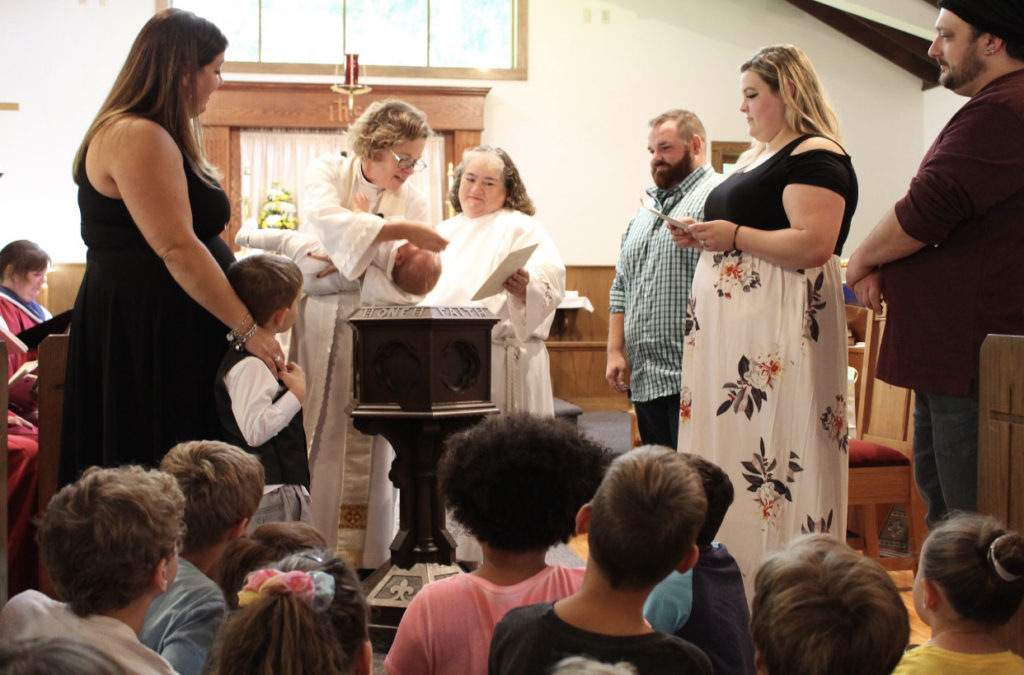Sacraments
A sacrament is a Christian rite that is the outward and visible sign of God’s grace; that is, God’s love for all people and all creation. We do not earn God’s grace; it is given freely because God loves us. We believe that sacraments are a way God communicates grace and life to the world.
Baptism
Baptism is the sacrament by which we as children of God become members of Christ’s body, the Church. The Episcopal understanding is that baptism is not a promise of individual salvation but an incorporation into the community of the Church, which is the community that bears witness that God has saved the world. Baptism is the one sacrament that is mutually recognized among all Christian traditions.
All people of any age are welcome to be baptized. Those interested in the Sacrament of Baptism should contact Rev. Johanna.

Eucharist (Holy Communion)
Eucharist, or Holy Communion, is the sacrament commanded by Jesus for the continual remembrance of his life, death and resurrection. In the Eucharist, the ordinary elements of bread and wine are taken, blessed, broken and shared. Through the imagery of a shared meal, the Holy Spirit consecrates these ordinary gifts to become the body and blood of Christ in order to nourish us for our spiritual journey through this life. So empowered, we are invited to serve the world in sacrificial love. Eucharist comes from the Greek word, “eucharisteo” which means “to give thanks.”
Confirmation
Confirmation is the adult affirmation for those baptized as infants. At baptism, parents and Godparents make promises on behalf of the child being baptized. Confirmation is the opportunity to make those promises for oneself as an adult
Confirmation is offered by the bishop when he visits a parish. Advance preparation is required. This sacrament is intended for young adults and adults. Please contact the parish office if interested in Confirmation.
Marriage
Holy Matrimony, or Marriage, is the sacrament in which two people enter into a life-long union of love by making vows before God and the Church. In Marriage the couple receives the grace and blessing of God to help them keep their vows.
At Trinity, marriage is available to all couples. Both the Episcopal Church and the State of Rhode Island recognize marriage equality. Marriage requires much advance notice and preparation. The Episcopal Church requires the couple participate in premarital sessions with the clergy. If interested in marriage, please contact the parish office.
Reconciliation of a Penitent
In this sacrament, also known as Confession, one confesses one’s sins to God in the presence of a priest and receives the assurance of pardon and the grace of absolution. The priest is present to listen to the one confessing, offer any counsel, and pronounce God’s forgiveness.
One need not make a private confession to a priest. At most Episcopal liturgies the congregation confesses their sins and God’s absolution is pronounced. At certain times in life, however, one may find the need for private confession with a priest. No one must do so, but all are welcome. If interested in making your confession or discussing if this might be a time you would benefit from private confession, please contact the parish office.
Anointing of the Sick
It is an ancient practice of the Church that, when one is ill, the clergy are called. When visiting the person who is ill, prayers and anointing with oil on the forehead are offered by the priest. God is asked to impart grace for the healing of spirit, mind, and body. For more information or if you wish to make arrangements for a pastoral visit, please contact the parish office.
Burial
Although the Burial of the Dead is not a sacramental rite, it is an important rite for every Christian. In The Episcopal Church, funerals are conducted in the church or, at times, in a funeral home; and people may be buried or cremated. For more information, please contact the parish office.
Ordination
Ordination, or Holy Orders, is the sacrament whereby the grace of the Holy Spirit is given to those being made bishops, priests, and deacons. The journey to ordination is lengthy and involves much discernment. The first step is contacting the rector for an initial conversation.

